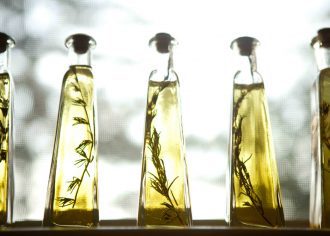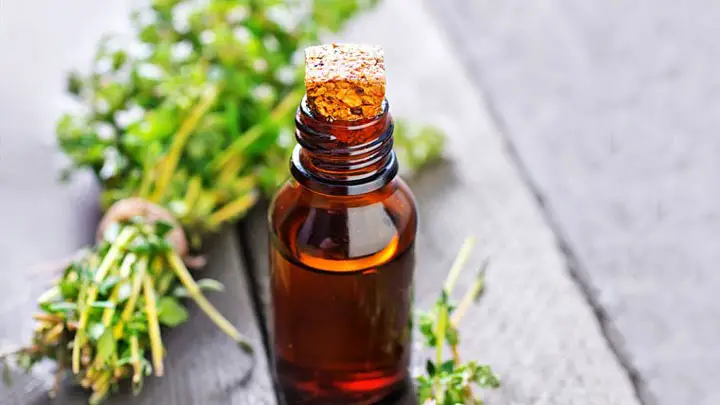Contributing writer for Wake Up World
Includes an easy-to-make Thyme Oil recipe!
Superbugs like methicillin-resistant Staphylococcus aureus (MRSA) are on the rise and, unfortunately, are becoming resistant to the drugs used to treat them. When faced with a microbial infection, using natural antibacterial agents may not only be more effective but also safe and risk-free.
In addition to using spices like garlic, essential oils derived from herbs – like thyme oil – not only have antibacterial properties, they also provide a number of other health benefits. Before I go into thyme oil’s antimicrobial functions, let me share some information on the essential oil.
What Is Thyme Oil?
[pro_ad_display_adzone id=”110028″]
Oil of thyme is derived from thyme, also known as Thymus vulgaris. The perennial herb, a member of the mint family, is used in aromatherapy, cooking, potpourri, mouthwashes and elixirs, as well as in ointments. Thyme also has a number of medicinal properties, which is due to the herb’s essential oils.1
The benefits of thyme essential oil have been recognized for thousands of years in Mediterranean countries. This substance is also a common agent in Ayurvedic practice.2 Today, among the many producers of thyme oil, France, Morocco and Spain emerge as the primary countries bottling thyme oil.3
Uses of Thyme Oil
Due to thyme oil’s antibacterial, antispasmodic, anti-rheumatic, expectorant, hypertensive and calming properties, it has a long list of uses that include:4, 5
| Home remedy — Thyme oil is used to help relieve and treat problems like gout, arthritis, wounds, bites and sores, water retention, menstrual and menopausal problems, nausea and fatigue, respiratory problems (like colds), skin conditions (oily skin and scars), athlete’s foot, hangovers and even depression. |
| Aromatherapy oil — The oil can be used to stimulate the mind, strengthen memory and concentration and calm the nerves. |
| Hair product — It is said that thyme oil can help prevent hair loss, and is even added to shampoos and other hair products. |
| Skin product — Thyme oil can help tone aged skin and prevent acne outbreaks. |
| Mouthwashes and herbal rinses — Like peppermint, wintergreen and eucalyptus oils, thyme oil is used to improve oral health. |
| Insecticide/insect repellent — Thyme oil can keep insects and parasites such as mosquitoes, fleas, lice and moths away. |
Composition of Thyme Oil
Thyme is an example of an herb with over 300 varieties and various chemotypes, which are plants with the same appearance, but which have different chemical compositions. Each chemotype yields different oils with corresponding therapeutic benefits.6
This occurs when the plant is grown in different environments, climates and soil.7 Depending on which chemotype it is derived from, the oil of thyme produced will have a distinct chemical structure. The known chemotypes 8 are:
| Thymus vulgaris thymol — This chemotype has strong antiseptic activities and is 60 to 70 percent thymol. It goes by the name of “thyme” and “red thyme,” and is harvested during the fall. |
| Thymus vulgaris linalool — This is the most gentle of all thyme chemotypes. Referred to as “garden thyme,” this variation has potent antiparasitic and antifungal properties, and is grown in high altitudes. |
|
Thymus vulgaris carvacrol — As its name suggests, this type contains the chemical constituent carvacrol. Its amount will depend on when it is harvested. When collected in the spring, it will contain 30 percent carvacrol, and 60 to 80 percent when harvested right after flowering or during the fall. T. vulgaris carvacrol is known for its antiseptic properties. |
| Thymus vulgaris thujanol — Found only in the wild, this plant contains 50 percent thujanol and is known for its beneficial effects on the immune system and hormones. It is often called “sweet thyme.” |
| Thymus vulgaris alpha-terpineol — This type is harvested during the early spring and has a pepper-like smell. |
| Thymus vulgaris geraniol — The geraniol chemotype has a lemon-like fragrance and is grown in high altitudes. It is often picked during autumn. |
| Thymus vulgaris 1,8 cineole — This contains 80 to 90 percent cineole and has diuretic, anticatarrhal, expectorant and analgesic properties. |
| Thymus vulgaris p-cymene — This should be obtained within spring or else it becomes a different chemotype. |
| Thymus vulgaris phenol — These are thyme plants that grow in high altitudes and contain up to 90 percent of phenol compounds. |
Benefits of Thyme Oil
As I previously mentioned, thyme oil is an effective natural agent against nasty bacterial strains. A study 9 presented at the Society for General Microbiology’s spring conference in Edinburgh pointed out that essential oils may be efficient and affordable alternatives to antibiotics in the battle against resistant bacteria.
Among the essential oils tested, cinnamon oil and thyme oil were found to be the most successful against various Staphylococcus species, including the dreaded MRSA. Researchers said that this can help lower antibiotic use and minimize the formation of new resistant strains of microorganisms.
Oil of thyme can also function as a decontaminant for food products. As shown in Food Microbiology, both basil and thyme essential oils exhibited antimicrobial properties against Shigella sonnei and Shigella flexneri that may contaminate food. The compounds thymol and carvacrol in thyme oil demonstrated this benefit.10
Furthermore, thyme oil can be used as a preservative against spoilage and several foodborne germs that can contribute to health problems. It is effective against other forms of bacteria such as Salmonella, Enterococcus, Escherichia and Pseudomonas species.11
Other reports also show that oil of thyme has anti-inflammatory properties. In a research article published in the Journal of Lipid Research,12 six essential oils including thyme oil showed the ability to suppress the inflammatory cyclooxygenase-2 (COX-2) enzyme in the same manner as the antioxidant resveratrol does.
It was noted that the chemical constituent carvacrol was responsible for this effect. The same study also noted that thyme and the other essential oils activated peroxisome proliferator-activated receptors (PPARs), which help suppress COX-2 expression.13 In addition to these, significant health benefits of thyme oil include:14
| Helps reduce symptoms of chronic fatigue syndrome | Stimulates menstrual flow |
| Increases circulation and elevates low blood pressure | Triggers the removal of waste that may lead to cellulite |
| Eases nervousness and anxiety | Helps fight insomnia |
| Eliminates bad breath and body odor |
[pro_ad_display_adzone id=”110030″]
How to Make Thyme Oil
Thyme essential oil is produced through the steam distillation of the fresh or partially dried leaves and flowers of the thyme plant. Distillation produces a red, brown or orange colored thyme oil, which has a strong, spicy smell. Further distillation yields white thyme oil, a clear or pale-yellow oil with a mild fragrance.15
As mentioned before, its chemical composition varies depending on the type of thyme used in production. Fortunately, you can make infused thyme oil at home. Here’s one guide you can use.16
What you need:
- 1/2 cup fresh thyme
- 8 ounces carrier oil (ex. olive oil)
- Mortar and pestle
- Saucepan
- Funnel
- Glass container
Procedure:
- Wash the herbs and dry it by patting it with a clean cloth. You may also dry it in the sun or place it in a salad spinner.
- Crush the herbs using the mortar and pestle to release their natural oils.
- Place the crushed thyme and its oil into the saucepan, and place the carrier oil. Simmer this mixture over medium heat for at least five minutes or until it produces bubbles.
- Turn the heat off and allow the mixture to cool. Pour the mixture into the glass container then store in a cool place.
How Does Thyme Oil Work?
Thyme oil can be used in a number of ways. It can be inhaled, applied topically or used as a mouthwash. Below are some particular ways to enjoy its benefits:17
| Relieve pain — Mix three drops of thyme oil with 2 teaspoons of sesame oil. Use this mixture as a massage oil and apply on the abdominal area to relieve pain. This may also be used as a massage oil to treat other types of pain. |
| Alleviate fatigue — Add two drops of thyme oil to your bath water. |
| Improve sleep — Add a few drops to your diffuser. |
| Promote oral health — Use thyme oil as a mouthwash by adding one drop to a cup of warm water. |
| Reduce appearance of scars and skin marks — Apply oil of thyme mixed with any carrier oil (like almond oil) on the affected area. |
| Use as cleanser — Add a few drops of thyme oil to your facial wash. |
| Treat or protect against respiratory problems — Add two drops of thyme oil to hot water and use for steam inhalation. |
| Uplift mood — Simply inhale the scent of thyme oil. |
Is Thyme Oil Safe?
Thyme oil should not be used directly on skin, as it can cause sensitization. It must be first diluted with a carrier oil (like olive oil or almond oil). Before use, test on a small area to see if you have any allergies.18
This herbal oil should not be taken internally, as it can cause nausea, dizziness, vomiting, diarrhea and muscle problems. Doing so may also negatively impact your heart, lungs and body temperature.19 It may also stimulate the thyroid gland, which is why this essential oil is not recommended for people with hyperthyroidism.
Since thyme oil can be used to increase circulation, it should be avoided by people with high blood pressure.20 Pregnant women should steer clear of thyme oil because it can stimulate menstrual flow.21 Thyme oil should also be kept away from infants and young children because they are sensitive.
Thyme Oil Side Effects
Use of thyme oil may result in allergic reactions, even when it’s diluted. Some people who use it may experience dermatitis or inflammation of the skin. People with allergies to rosemary or mint oils should also stay away from thyme and its essential oil. Of course, this article is not intended to provide medical advice; always consult your physician and/or someone knowledgeable in essential oils before using one, especially if you’re suffering from any disease or are taking certain medications.
Sources and references:
- 1, 5 OrganicFacts.com, Health Benefits of Thyme Essential Oil
- 2, 17 Ayurvedic Oils, March 19, 2013
- 3, 14, 15, 21 Wilson, Roberta, Aromatherapy: Essential Oils for Vibrant Health and Beauty, p.126
- 4, 18 EveryGreenHerb.com, Thyme essential oil in herbal medicine
- 6, 8 Experience-Essential-Oils.com, Thyme Oil boosts Immunity and improves Concentration!
- 7 Aromatherapy Lifestyle, Thyme Sweet Essential Oil
- 9 Science Daily, April 4, 2010
- 10 Food Microbiology, February 2004;21(1):33-42
- 11 Medical News Today, September 12, 2013
- 12 Science Daily, January 14, 2010
- 13 Journal of Lipid Research, January 2010;51(1):132-9
- 16 Leaf.tv, How to Make Thyme Oil
- 19 Rodale’s Illustrated Encyclopedia of Herbs, Kowalchik and Hylton, January 5, 1998
- 20 Esoteric Oils, High Blood Pressure
About the author:
 Born and raised in the inner city of Chicago, IL, Dr. Joseph Mercola is an osteopathic physician trained in both traditional and natural medicine. Board-certified in family medicine, Dr. Mercola served as the chairman of the family medicine department at St. Alexius Medical Center for five years, and in 2012 was granted fellowship status by the American College of Nutrition (ACN).
Born and raised in the inner city of Chicago, IL, Dr. Joseph Mercola is an osteopathic physician trained in both traditional and natural medicine. Board-certified in family medicine, Dr. Mercola served as the chairman of the family medicine department at St. Alexius Medical Center for five years, and in 2012 was granted fellowship status by the American College of Nutrition (ACN).
While in practice in the late 80s, Dr. Mercola realized the drugs he was prescribing to chronically ill patients were not working. By the early 90s, he began exploring the world of natural medicine, and soon changed the way he practiced medicine.
In 1997 Dr. Mercola founded Mercola.com, which is now routinely among the top 10 health sites on the internet. His passion is to transform the traditional medical paradigm in the United States. “The existing medical establishment is responsible for killing and permanently injuring millions of Americans… You want practical health solutions without the hype, and that’s what I offer.”
Visit Mercola.com for more information, or read Dr. Mercola’s full bio and résumé here.
Recommended articles by Dr. Joseph Mercola:
- Basic Yoga Moves to Improve Balance, Mood and Flexibility
- Medical Errors: Still the Third Leading Cause of Death
- Battered Bees and the Threat to Our Food Supply
- The Biggest Cause of Anxiety and Depression is Traumatic Life Events
- Zika: Brazil Admits It’s Not the Virus
- Plants Are Smarter Than You Think
- Scientific Links Between Processed Foods and Depression
- How Sugar Harms Your Brain Health and Drives Alzheimer’s Epidemic
- The Health Benefits of Intermittent Fasting
- Can a Hug a Day Keep Infection Away?
- The Magic Healing Power of Mushrooms
- The Science of Healing Thoughts
- Caring for an Aging or Dying Pet – What You Need to Know (and Some Help with Your Grief)
[pro_ad_display_adzone id=”110027″]








